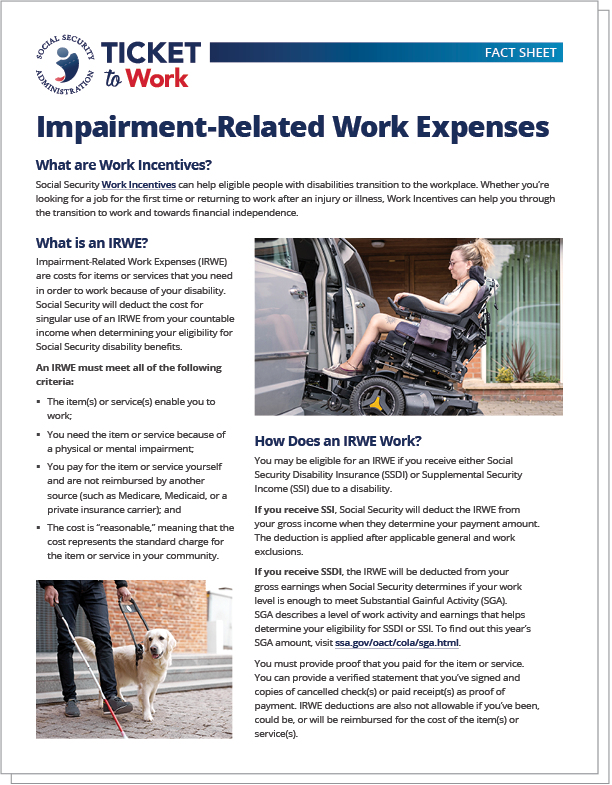Social Security makes every effort to ensure that any information published is accurate and up to date, but some information on this webpage may be historical.
Impairment-Related Work Expenses
 What are Work Incentives?
What are Work Incentives?
Social Security Work Incentives can help eligible people with disabilities transition to the workplace. Whether you're looking for a job for the first time or returning to work after an injury or illness, Work Incentives can help you through the transition to work and towards financial independence.
What is an IRWE?
Impairment-Related Work Expenses (IRWE) are costs for items or services that you need in order to work because of your disability. Social Security will deduct the cost for singular use of an IRWE from your countable income when determining your eligibility for Social Security disability benefits.
An IRWE must meet all of the following criteria:
- The item(s) or service(s) enable you to work;
- You need the item or service because of a physical or mental impairment;
- You pay for the item or service yourself and are not reimbursed by another source (such as Medicare, Medicaid, or a private insurance carrier); and
- The cost is "reasonable", meaning that the cost represents the standard charge for the item or service in your community.
How Does an IRWE Work?
You may be eligible for an IRWE if you receive either Social Security Disability Insurance (SSDI) or Supplemental Security Income (SSI) due to a disability.
If you receive SSI, Social Security will deduct the IRWE from your gross income when they determine your payment amount. The deduction is applied after applicable general and work exclusions.
If you receive SSDI, the IRWE will be deducted from your gross earnings when Social Security determines if your work level is enough to meet Substantial Gainful Activity (SGA). SGA describes a level of work activity and earnings that helps determine your eligibility for SSDI or SSI. To find out this year's SGA amount, visit ssa.gov/oact/cola/sga.html.
You must provide proof that you paid for the item or service. You can provide a verified statement that you've signed and copies of cancelled check(s) or paid receipt(s) as proof of payment. IRWE deductions are also not allowable if you've been, could be, or will be reimbursed for the cost of the item(s) or service(s).
Let’s Look at an Example of Using an IRWE:
Ellen receives SSI benefits due to a disability. She earns $1,025 per month from work, and this is her only income. Each month, she pays $250 for a special transportation service to commute to work. Ellen requires this service to get to work because of her disability. Social Security considers this expense an IRWE and deducts the cost from her countable income when determining her SSI payment:
| $1,025 | Ellen's earned income |
| ‒ $20 | General exclusion |
| ‒ $65 | Work exclusion |
| ‒ $250 | IRWE deduction for monthly transportation expenses |
| $690 | Income left after deductions and exclusions |
| $690 / 2 | Social Security considers half of your income after deductions and exclusions as countable income |
| $345 | Although Ellen earns $1,025 per month, Social Security only counts $345 of it when calculating her eligibility for her SSI payment and amount |
What are Some Examples of an IRWE?
This chart shows a limited selection of IRWE examples. Find more at ssa.gov/redbook.
| TYPE OF EXPENSE | IRWE-DEDUCTIBLE COST | NOT DEDUCTIBLE AS AN IRWE |
|---|---|---|
| Transportation | Modifications to your vehicle related to your disability that allow you to commute | The base cost of your vehicle |
| Service Animals | Expenses paid for a guide dog or service animal that enables to you to work. This can include purchase of the animal, training, food, licenses, and veterinary services | Expenses for a non-service animal |
| Prosthesis | Artificial hip, artificial replacement of an arm, leg, or other part of the body | Any prosthetic device that is primarily for cosmetic purpose |
Does an Expense Count as an IRWE if I also Use that Item or Service Outside of Work for Daily Living?
Yes. As long as you need the item or service to enable you to work, it can be considered an IRWE. For example, if you have a hearing impairment, your employer may provide you with an accessible telephone as a reasonable accommodation. However, your employer wouldn't supply you with a hearing aid because you use it outside of work too. Since your hearing aid enables you to participate in workplace conversations with managers, co-workers, and clients — as well as participate in group meetings — your hearing aid may be considered an IRWE.
Learn More
To learn more about the Ticket Program, call the Ticket to Work Help Line at 1-866-968-7842 or 1-866-833-2967 (TTY) Monday through Friday, 8 a.m. to 8 p.m. ET. Ask a representative to send you a list of service providers or find providers on your own with the Ticket Program Find Help tool.
Learn More
To learn more about the Ticket Program, call the Ticket to Work Help Line at 1-866-968-7842 or 1-866-833-2967 (TTY) Monday through Friday, 8 a.m. to 8 p.m. ET. Ask a representative to send you a list of service providers or find providers on your own with the Ticket Program Find Help tool.